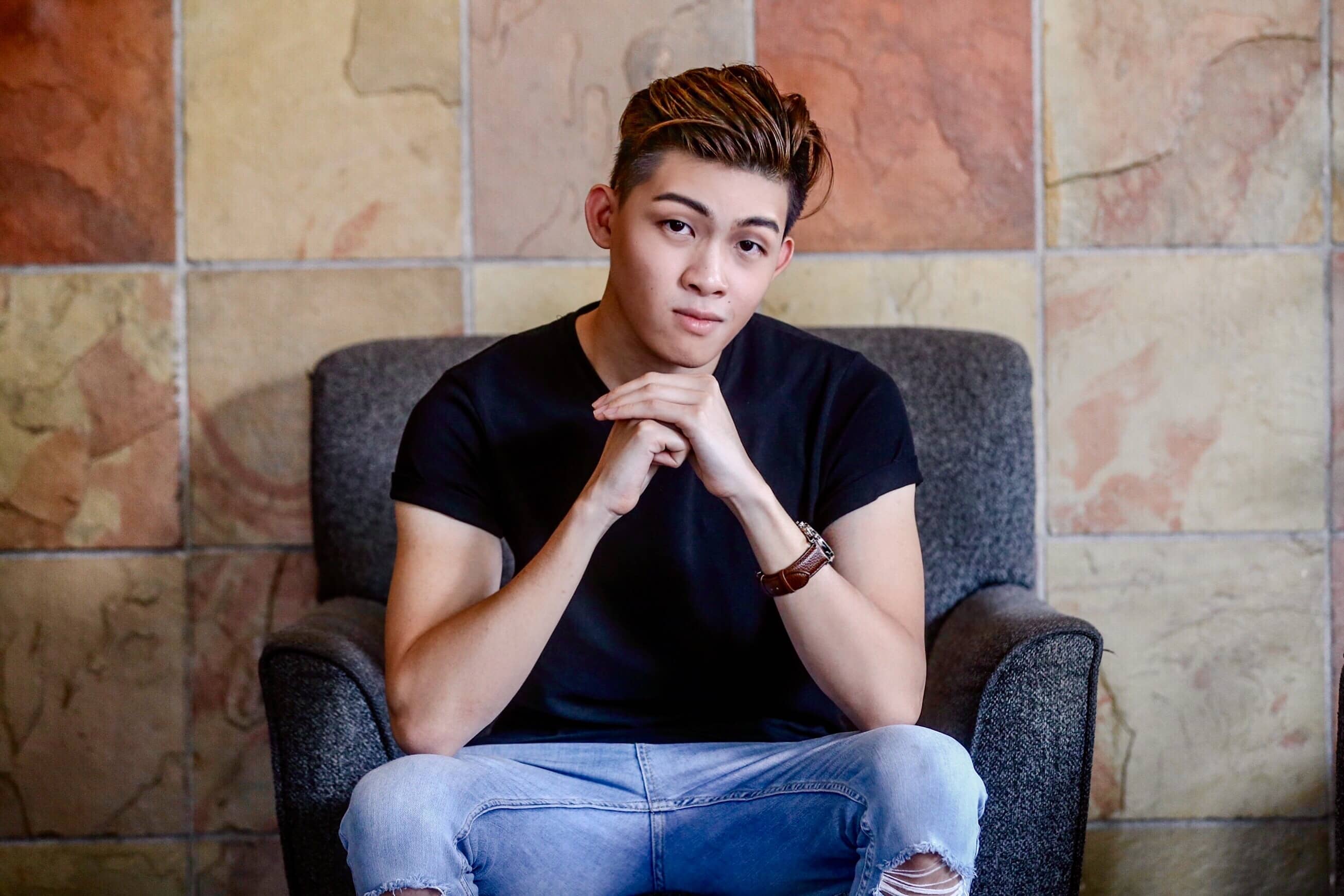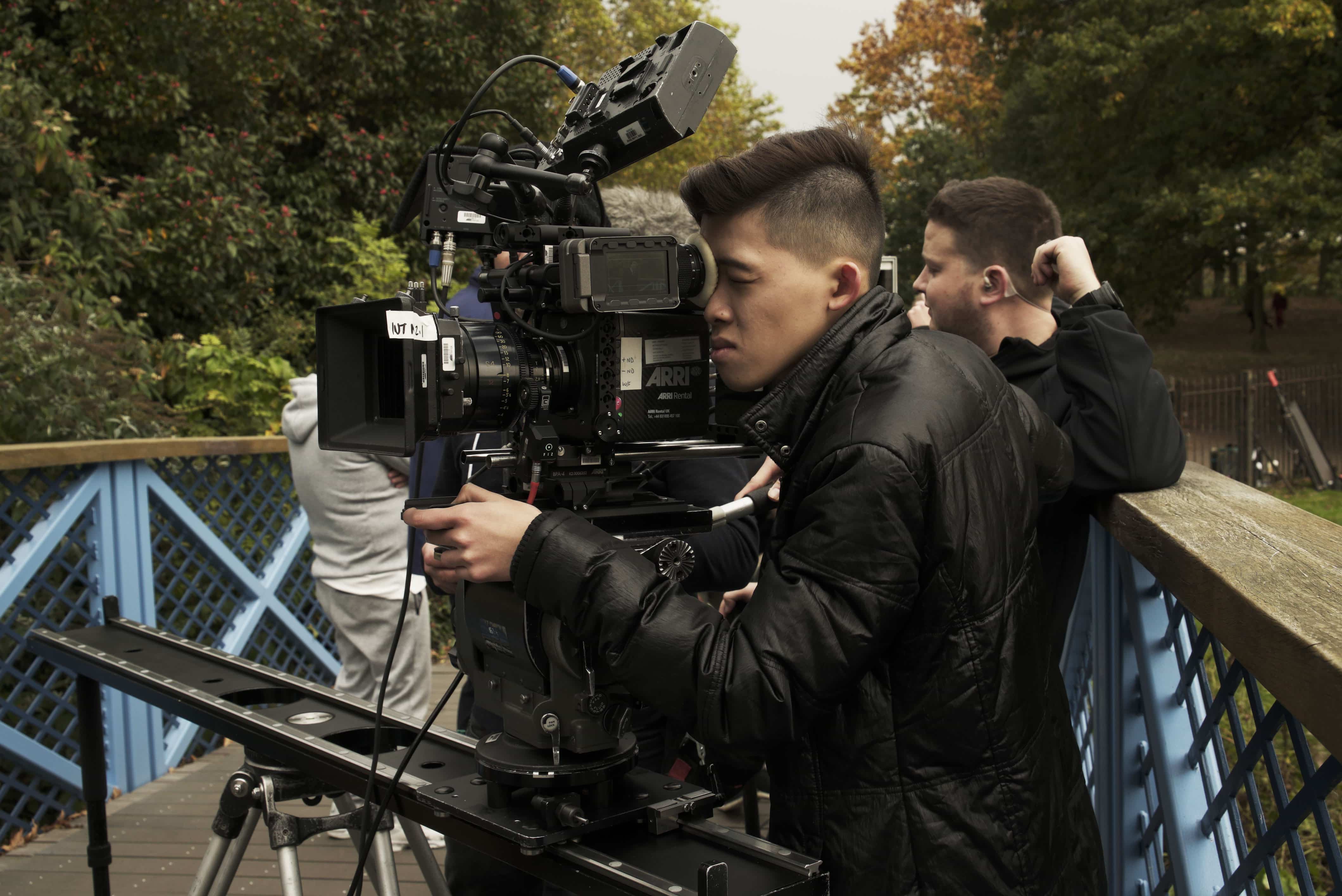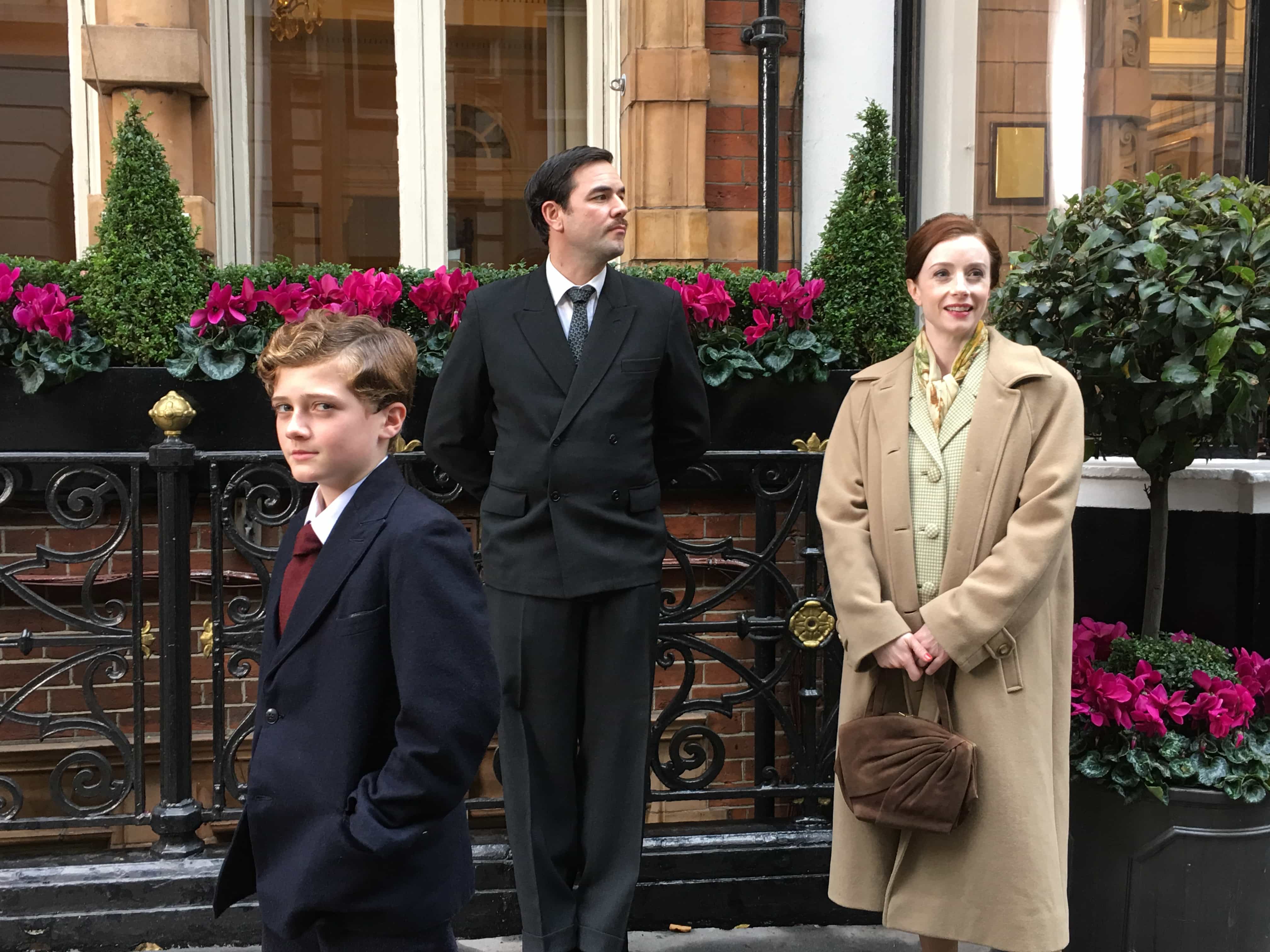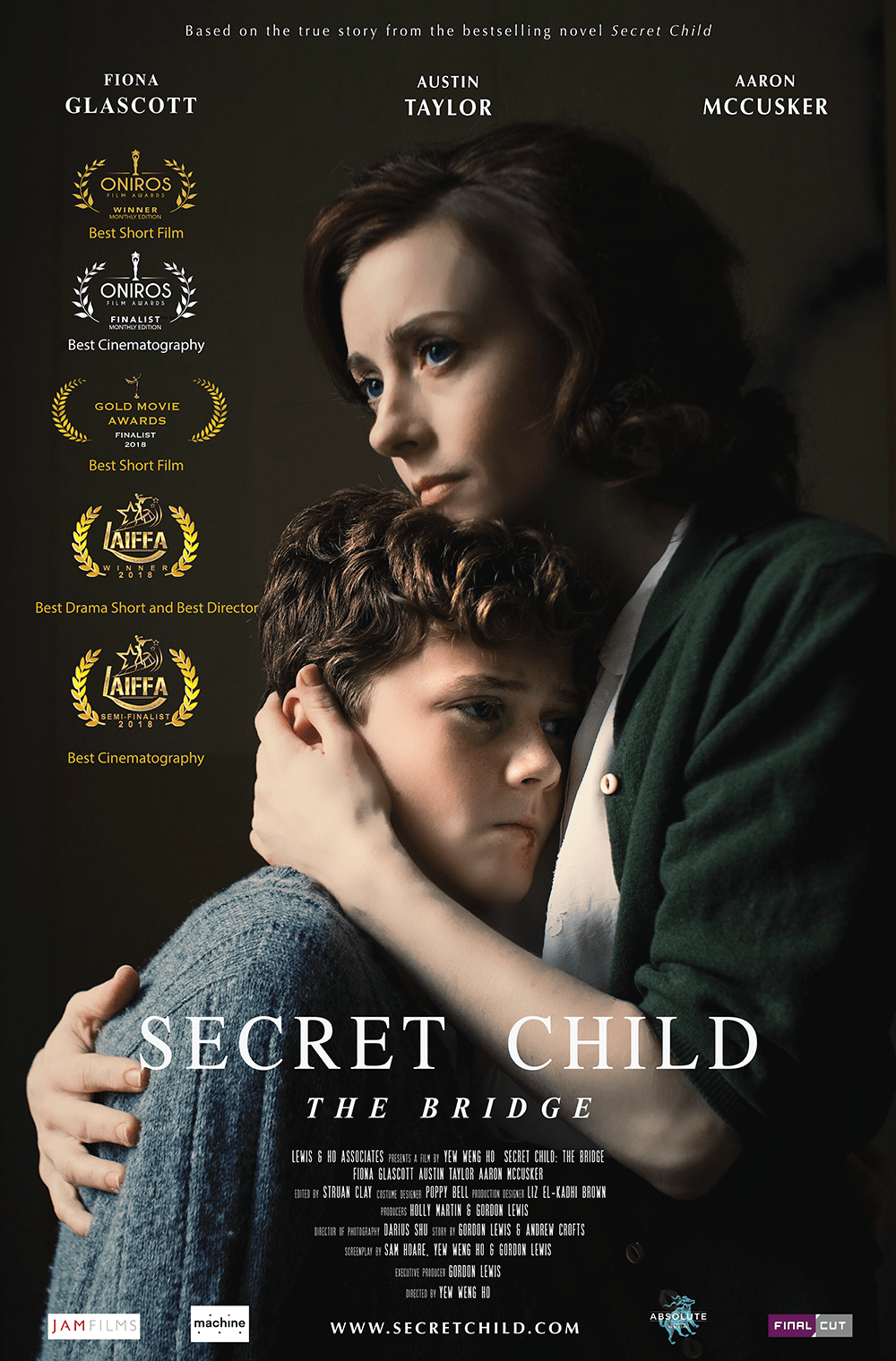
Pic credit: firdaus latif
Could you tell us a little bit about yourself?
Hi, I’m Darius, and I’m a director of photography and fashion photographer. I’m 24 this year. I did my bachelor’s degree in Mass Communication, while majoring in Broadcasting at Taylor’s University Malaysia.
From my degree I learnt a lot about TV production and the media industry. I then pursued my master’s in Film Production, specializing in Cinematography at the Arts University Bournemouth, in the United Kingdom. I chose that because I wanted to get more involved with film production and filmmaking instead.
Tell us a little more about the new film you’re working on, The Secret Child. How many awards has it received?
Secret Child is a true story based on the bestselling book by Gordon Lewis. Ultimately, it’s a love story with difficult beginnings. The film tells the story of a single mother, Cathleen, and her eight-year-old son. They live in a hostel for single mothers in Dublin, Ireland called the Regina Coeli.
She had this secret child from a brief affair with a man from Cork, and is determined to keep the baby. One day, she decides to introduce her son to the man she had fell head over heels for, Bill Lewis, who she hasn’t seen in nine years.
Hugely talented Irish actress Fiona Glascott, mostly recently seen on the big screen in Brooklyn and now the upcoming Harry Potter franchise Fantastic Beasts: The Crime of Grindelwald, plays Cathleen, while Northern Irish actor Aaron McCusker, who will next play Freddy Mercury’s Irish lover Jim Hutton in the upcoming biopic Bohemian Rhapsody, plays the role of Bill. Ten-year-old English actor Austin Taylor (seen in My Cousin Rachel), plays a young Gordon in the short.
Recently the film won Best Drama Short, Best Director, and I’m currently being nominated for the best cinematography award in Hollywood, at the Los Angeles Independent Film Awards.
Secret Child also won the Best Short Film award and was nominated for Best Cinematography at Italy’s Oniros Film Awards last April. It also won the Best Short award at the Gold Movie Awards London, which will be screened at the BAFTA Theatre next year.
I’ve also recently been nominated for the Best Cinematography award at the Switzerland’s Largo Film Awards.
There are more festivals we’re aiming for from Australia, Europe, Canada, USA and Asia.
What sparked your love for filmmaking? Who is your inspiration?
I developed filmmaking from my love of photography. I find cinematography and photography to be like brothers and sisters – filmmaking is an extension of photography. People who know me would joke, “You have a third eye and you see things other people don’t when it comes to taking photographs and filming.”
One day, a friend of mine who was also a director asked me to take charge of her production, because she loved my work as a photographer. This was my big break to become a DOP (Director of Photography). In this new position I could use specialised lighting and other equipment, which allowed me to have much more control over the production.
I must sound like a control freak now – I’m not, I just happen to care about creating high-quality work. I love what I do, and it’s turned out to be a career for me. I took a leap of faith jumping into this industry and have not regretted it since.
Soon after, I found myself in demand despite my age. My work ranged from fashion magazines, music videos, documentaries, commercials and films. As with all things, the more you do, the better you become as you learn and experiment.

Darius filming on the set of secret child
Especially documentaries – with documentaries, you have to be a bit more intuitive in terms of cinematography. People always say I have a distinctive look and style to my work – I don’t notice it myself, but I guess it’s a good thing that people feel that way.
Roger Deakins is definitely an inspiration of mine. I’m in love with the way he tells stories visually. Denis Villeneuve and Christopher Nolan are also inspirational because of their great storytelling.
I’m a very story driven person, and I love it when films become a work of art, and not just car crashes and explosions. A story has to make you think. I consider my work as visual poetry, and I put a lot of love and care into what I do, even if it means I’ll need an extra few months storyboarding and brainstorming to perfect it.
Did you have other passions before doing film/videography?
Definitely. I’ve always been an artistic person, even when I was three years old. I was always drawing and painting. My parents would send me to art classes, and mother taught me to play the piano. That was probably how I got into songwriting and music production. Music still is a big part of my life. I previously had a song published on Spotify. It was my first attempt to produce a song without a big budget. I wrote and produced the song myself and had one of my friends sing the song for me.
I love interior designing as well. I love looking at colours and figuring out which colour matches each other. I would start to decorate and design my own home and watch home shows at the age of 13. This probably led to good background knowledge in production design in films.
You must already be thinking “this guy changed his interest a lot!” Well, it wasn’t easy at first, being lost and not knowing which direction to go. At one point in my childhood, I even had a feeling that I was talentless, because it was hard for me to fit in due to my interest in arts. I always felt different. I was never the person who would talk about football or sports, and I spent my day dreaming up visionary ideas for drawings, or thinking of a melody for a song while the other guys headed to the field.
Later I found myself loving still photography. My parents always said that I was a visual learner. To that end, being in an art school doing films was the best experience ever. I just love making images. I now realize it’s a good thing that I had an interest in all of these since young, as I now have the knowledge of the entire production process. I’m aware of every single department, and all the processes involved in making a film. From music, to imaging, and how it complements each other to the tiniest detail – it all definitely helps when I look back at it.

source: darius shu photography facebook page
I started venturing into fashion photography not just because of my love for fashion, but because it allowed me to bring out the artistic side of me. When I bought my first camera at 18, I didn’t start out by taking photos of landscape or plants. Instead I was interested in taking portraits of people. I just love making people look good on camera, even if they weren’t camera-friendly or professional models. That’s when I started looking at glossy magazines such as Vogue, Harper’s Bazaar, and GQ for more ideas to make my photograph stand out. I wanted to set myself apart from the competition.
I guess all this naturally led me into filmmaking, which to me was an extension of photography. It’s a good thing as well, because I now have the experience and knowledge of other parts of filmmaking, such as music and production design. These skills complement the visuals and images I create from start to end, helping me develop a good understanding of the entire production process.

source: darius shu photography facebook page
What has been the hardest thing to deal with while working on these projects?
When you’re working with such a big team, communication is key. You need to be able to communicate exactly what you want to achieve.
For example, to create the visual you had in mind, you have to be able to tell the gaffer exactly the kind of lighting you want. Lighting is easily one of the hardest parts of the job – sometimes it’s all about instinct and luck. When you’re on set, sometimes you get to see different things that weren’t planned on paper. You work with that, and that becomes the final decision for lighting.
Spending months just visualizing every single detail in your head is also exhausting. Sometimes, you just got to take some time off and then come back to the drawing board again with fresh eyes.
I’m very lucky to have such a brilliant, professional, talented, respectful, and easy-to-work-with crew for Secret Child. I’m also thankful that we all had the same vision for the film. This is important as film is a collaborative process. When you have a great team by your side, it all leads to the production of a great film.

Secret child main actors
Any particular reason why you chose to study Masters in Britain?
I chose the UK as it’s a global player in the industry. I always strive to achieve my biggest dreams, so naturally the UK was a good place to start. It lets me work with professionals at the top of the industry. It’s also a great place for the available talents and creatives, as well as having a flourishing art culture.
Tell us about your experience being in London! Was it fun, enjoyable, difficult?
I love London. It has amazing food, culture, people, history, and architecture. Most importantly, it has a wonderful arts and theatre scene. I’ve met the most talented people, and I find the whole journey and experience to be the most worthwhile and fun. I’ve also made friends from around the world. It’s inspiring, and I just love being in an environment that constantly feeds on art and creativity with no boundaries. It’s also great to having the freedom to be who I want to be without being judged.
Being here has also made me a more confident person. Don’t get me wrong – there were challenging and difficult times as well, especially when you live in such a big city. Sometimes you tend to feel lost, but it’s all matter of being positive and physically and mentally strong.
How did you get involved in these films? (Did they approach you or vice versa?)
I’m very grateful to have directors and producers approach me to work on their projects, which was what happened in the last three films I worked on before Secret Child. On one of these projects, I was even flown out to India for a film shoot, working alongside a Bollywood crew. Secret Child was the same as well. I knew about the project through a contact who knew the producers and the director of the film. I sent my showreel to them, and got it.
When I read the brief for the project, I was keen on being involved with the film. The story and subject matter caught my attention, since it’s a 1950s-period film. I wanted to do something I hadn’t done before. I was lucky when a few days later, I was informed that the producer was impressed with my previous work and wanted me on board the Secret Child. It has since been one of the best film sets I’ve worked on.

Darius with austin taylor on secret child
What’s it like working on these film projects? Tell us the whole thing, the fun times, the struggles, working hours, etc.
Every film takes months of preparation. Even for a short film, it’s normally between 2 to 3 months. It’s great because the first few weeks you’ll just be brainstorming with the director. You try to get into their minds as much as possible and understand their vision and try to realize that. Brainstorming is definitely the most exciting, and also the most tiresome part.
I love the adrenaline when I get a whole vision of the script in my head. When that happens, I start planning out the visuals, shots and lighting. I prefer operating the camera on my own, as the only way for me to feel the scene is through the lens of the camera. It also allows me to move instinctively at any given point during the shoot. This lets me work with the actors if they choose to improvise. I can’t do that if I had an operator and had to tell them what to do. The only exception is if we needed a Steadicam or drone etc, then I would need to have an operator.
So far on the film sets I’ve been, we’ve been strict on working hours, so we often finished on schedule after a 10 to 12-hour shoot.
Sometimes the struggle is to fit in all the shots planned in the scheduled amount of shoot days. Things get delayed and sometimes you have to improvise on the spot to get it done. That’s when the stress comes in! Still, the crew I worked with on Secret Child, we had fun during the shoot, making jokes and having a good laugh with the cast. It helped alleviate the stress, and allowed us to bond with each other.

Darius with fiona glascott and austin taylor on secret child
What have you learned while doing these films? Any memorable experiences to share?
I learnt to appreciate films more. Now I have a better idea of what makes a good film, and what makes a bad one. I love it when a film is being thought through. You can see it from its execution. I love films which tell a story and makes you think, instead of just being spoon-fed everything.
What have you learned from filmmaking? Has it influenced how you view life?
I’d say I can never watch a movie in the cinema the normal way ever again, haha.
In a way, filmmaking has thought me more about life as I’m seeing things from different perspectives. For example, I’ve had to research on classic films and the background history of all the stories I’m involved in. It’s an eye-opener to me, and it teaches you to never stop learning. That’s what I like about it, because no project is ever the same, and you have to keep learning and experimenting new things. I’m not the kind of person who can do a 9-5 job, so I need things to be constantly moving.
What are your thoughts in getting so many incredible awards for these independent films?
I feel proud to have people see my hard work and appreciate it. It’s a great thing because this is not just a recognition of my work, but also for the people and crew who I worked with as well. Having the film shown at prestigious film festivals in Los Angeles, Italy, and London is a great way to showcase the film to the world. I always aim to shoot and make films that are better than my last, and I’ll always keep that philosophy. I just love to have my visual creativity portrayed on the film.

Have you done anything that you weren’t proud of?
Definitely. I think the worst thing to have on set is anxiety and panic attacks. Anxiety influences your decisions and your planning. I now learn how to better manage it and be more focused in work. Having a good team definitely helps, as you know they’ll understand and trust you. You don’t want to have people trying to show off their ego and overpower what you do.
I had many challenging days just trying to stay positive while being on top of my game. Being motivated is important in this line of career. But sometimes I think of anxiety as part of being creative. Research shows that many creative people suffer from anxiety.
What advice do you have for other budding filmmakers in Malaysia?
It’s all about passion, hard work, and being dedicated to the craft. You need perseverance and positivity to make it in this industry, so it’s important to surround yourself with positive people and be constantly motivated to create content. Keep shooting, stay grounded, and never let that ego rise high, because as big as you think the film industry is, it’s a small world. When it comes to cinematography, every person sees things differently, so just go with your natural instincts and capture how you see the world. I do want to help young people in Malaysia, as I feel that I was lucky – Secret Child certainly opened doors for me.
Are you working on any upcoming projects? Tell us some!
I just finished co-directing and shooting my own film together with Arron Blake, who’s also a director. It’s a silent, psychological thriller titled ‘His Hands’ starring Arron Blake and Philip Brisebois. It’s a story of two men having the strangest encounter of their lives. It explores the themes of acceptance, identity and loneliness.
The film tries to make you understand something, then un-understand it, only to understand it again. I find it interesting for people to question the film at the end, and continue thinking about it the next day. It doesn’t have to be spelt out for you. That’s what great about film – it’s not just about big car crashes and explosions, but also making people think.
One of the themes of the film is sexuality. In it, there’s a lot of characters who battle with their sexuality – outside, they’re accepted by friends and family, but deep down they still struggle with their own personal issues. In real life, some people even throw that issue back at you and that’s a horrible thing to receive. It’s like a false sense of security when people say “Yeah, I’m fine with that, but you know there are people who are not.”
We want to showcase the power of cinematography and telling a story visually. We also wanted to prove we can create a visually stunning film on a low budget, and only with a two-man crew. It’s under our own production called Little Deer Films, and it’s our debut film. We hope to do more commercials about it and showcase it in the UK and the rest of the world. We’re also planning to produce another film in the second half of this year. It’ll be shot in London, so that will be exciting!
The producers of Secret Child are also in talks with BBC for a TV series, and I’ll be working closely with them for it.
More from Real Skills
How I Saved Almost RM50,000 On Buying My First Car
Here's how this Malaysian man with a RM3,500 salary saved RM50,000 on his first car.
Angry M’sian Boss Demands Unpaid Overtime Over Raya, Causes 9 Staff To Quit
An anonymous employee at a local SME shares how a bad-tempered boss eventually caused 9 staff to quit before Hari …
I Studied In Chinese School As A Malay Boy, Here’s What I Learnt
Every time I used Mandarin outside of school, family members would come up to me at gatherings and ask me …














